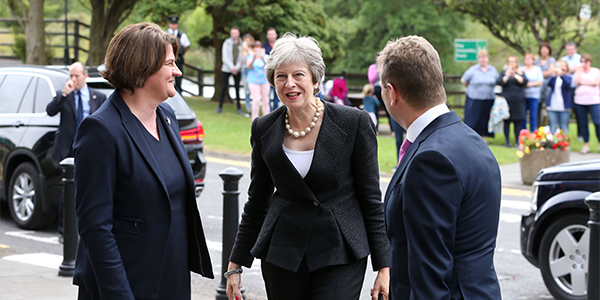The backstop is dividing Northern Ireland. We urgently need new talks
Brexit has become highly politicised in Northern Ireland. A damaging chasm is opening up between the two political blocs, and between the British and Irish governments, on the EU backstop. Mary C Murphy argues that a compromise formula is possible, but the lack of devolved government means new efforts – and new forums – will be needed to break the stalemate.

Theresa May and the DUP leader Arlene Foster. Photo: Northern Ireland Office via a CC BY 2.0 licence
In Northern Ireland, some 56% voted to remain in the EU in June 2016, and this included over 90% of nationalists and somewhere between 30–40% of unionists. Remain voters took their cues from four political parties in Northern Ireland – SDLP, Sinn Féin, the Ulster Unionist Party (UUP) and the Alliance Party, which all advocated for the UK to stay in the EU. Leave voters were influenced by the Democratic Unionist Party (DUP), which supported Brexit.
The national result – which clashed with the majority Remain vote in Northern Ireland – elicited a response from the then-functioning Northern Ireland Executive, which hinted at a number of shared cross-party and cross-community concerns about the impact of Brexit on Northern Ireland.
In a joint letter in August 2016, the First Minister and Deputy First Minister articulated their joint concerns about the impact of Brexit on Northern Ireland in relation to the border, economy, agri-food industry, energy sector and EU structural funds. The collapse of the Northern Ireland Executive and Assembly a few months later in January 2017 following the Renewable Heat Incentive (RHI) scandal ended any potential for further shared perspectives and positions to emerge in the short term.
The resulting political vacuum allowed vexing domestic disagreements to fester – including the RHI scandal, the status of the Irish language and marriage equality, and conflict legacy issues. In the process, delicate political relationships were undermined. Brexit has been caught in the crossfire of this deeply unstable environment.
The British Prime Minister’s speech in Northern Ireland on 20 July has done little to confront the sensitivities of two increasingly polarised communities.
In rejecting the EU’s backstop proposal, Theresa May has adopted a unionist interpretation of that facility. In other words, she views the backstop as a threat to the economic integrity of the UK’s internal market, and to the constitutional integrity of the UK.
This interpretation of the backstop conflicts with that articulated by nationalists. In May 2018, the party leaders of the SDLP and Sinn Féin, along with the Alliance Party and Green Party, issued a joint statement in which they affirmed that ‘the backstop agreed by both the British government and the EU27 is the bottom line in order to safeguard our political and economic stability now and for the future.’
The Irish government’s view of the backstop aligns with the nationalist interpretation. Although there is no explicit desire for a border in the Irish Sea, the Irish government’s support for the backstop amounts to the same thing among Unionists and many Conservative MPs. For some hardline unionists, the EU backstop is interpreted as practically facilitating the Irish government’s pursuit of a united Ireland.
The opposing positions adopted by the two governments reflect those of the two political blocs in Northern Ireland.
This contrasts starkly with key periods during the Northern Ireland peace process when the two governments sought to be neutral, objective and open-minded on disputed issues. The united front they presented created an atmosphere conducive to discussion and consensus-building among Northern Ireland’s political parties. The creation of the devolved power-sharing institutions was designed to create the same type of space.
The absence of devolved institutions, and a deterioration in relations between Britain and Ireland, has allowed Brexit to become highly politicised in Northern Ireland. Alongside lingering conflict-related issues, the politicisation of Brexit has produced polarising effects. The gap between unionism and nationalism has widened, and that chasm is being filled with feelings of mistrust and growing tensions.
A sharp political edge to Brexit is developing in Northern Ireland, which harks back to the darker days of its recent history when tensions between the two communities were high, and political and economic stability was elusive. Depoliticising the Brexit discussion, and in particular de-dramatising the EU’s backstop proposal, is imperative if a mutually agreeable solution is to be found which satisfies the EU, both governments, and the two political blocs in Northern Ireland.
Preventing a hard border on the island of Ireland is the stated preference of all the parties to the Brexit discussions. However, the negotiations and the approaches to date have been unsuccessful in terms of isolating an agreeable compromise. Nevertheless, finding a means to tease out a shared understanding of what is possible and practical in terms of a backstop solution is not beyond politicians’ ability.
With the Brexit deadline looming, now is the time to consider other mechanisms. Last week’s British-Irish Intergovernmental Conference may produce some progress. But more ambitious forums may be necessary, including a cross-party dialogue on Brexit, and a civic society stakeholder forum. This is where the detail, meaning, interpretation and language of the backstop is best resolved.
In Northern Ireland, politicisation invariably means polarisation. In the past, these twin forces have been mediated through (admittedly difficult) dialogue and discussion. Brexit represents as great a political or economic challenge as any faced by Northern Ireland over the past 20 years. The response should be robust and emphatic, and based on inclusive and consensual politics of the type which Northern Ireland has demonstrated in the past.
This post represents the views of the author and not those of Democratic Audit. It was first published on the LSE’s Brexit blog.
About the author
 Dr Mary C Murphy is a lecturer in politics and holds a Jean Monnet Chair in European Integration in University College Cork. She is the author of Europe and Northern Ireland’s Future: Negotiating Brexit’s Unique Case (Agenda Publishing 2018).
Dr Mary C Murphy is a lecturer in politics and holds a Jean Monnet Chair in European Integration in University College Cork. She is the author of Europe and Northern Ireland’s Future: Negotiating Brexit’s Unique Case (Agenda Publishing 2018).





 Democratic Audit's core funding is provided by the Joseph Rowntree Charitable Trust. Additional funding is provided by the London School of Economics.
Democratic Audit's core funding is provided by the Joseph Rowntree Charitable Trust. Additional funding is provided by the London School of Economics.
Yes, but…”This interpretation of the backstop conflicts with that articulated by nationalists. In May 2018, the party leaders of the SDLP and Sinn Féin, along with the Alliance Party and Green Party, issued a joint statement…” Since when were Alliance and the Greens ‘nationalist’? And didn’t the Official Unionists and Lady Hermon also campaign for a Remain vote in the referendum? This Brexit thing is only (originally) a DUP thing.